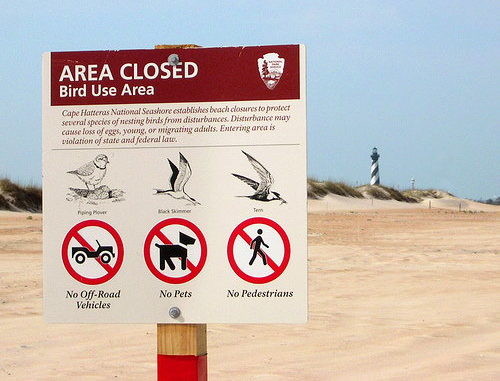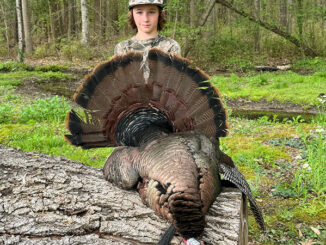
The consent-decree settlement regarding beach driving by ORVs at Cape Hatteras National Seashore apparently was all environmentalist plaintiffs — Audubon Society and Defenders of Wildlife — wanted.
The National Park Service closed three of the most popular surf-fishing areas at the Outer Banks May 5 as part of the consent decree, which was approved April 30 by Federal District Court Judge Terrence Boyle in Raleigh.
Areas closed to ORV traffic include Bodie Island Spit, Cape Point and South Point at Ocracoke Island. Each is popular with surf anglers, who recently have begun to make catches of large drum and bluefish as the spring season hits its peak. Cobia fishing will peak at The Point later during May.
At Cape Point, Park Service rangers told fishermen during mid-afternoon of May 5 they had to leave the area. The rangers posted signs that closed the beach just west of Ramp 44, effectively closing off access to what is probably the most famous area for surf fishing on the East Coast.
Access to the Point from the west, from Ramp 49 in Frisco, already is closed.
The South Point at Ocracoke Island was closed at about the same time, according to reports.
“I don’t know why they couldn’t have waited until 6 a.m. to close the beach,” said Bob Eakes, owner of Red Drum Tackle Shop in Buxton and a member of the Negotiated Rule-Making group that tried to work with the Audubon Society and Defenders of Wildlife to settle the issues of beach driving and bird and turtle protection, only to see the two environmentalists groups sue the National Park Service. Under the consent decree, the beaches are closed to ORVs from 10 p.m.- 6 a.m. — prime time for nighttime red drum fishing. Eakes said Park officials demanded immediate evacuation of the beach by ORV anglers.
Apparently ORV access advocates were correct in being upset with the consent decree. But pro-ORV anglers and local businesses said they had no choice but to go along with the settlement or Judge Boyle could have closed all CHNS beaches to ORV access.
“I’m so tired of the Park Service acting like everyone is so happy about the consent decree,” Eakes told the Island Free Press newspaper. “My community was forced to go along.”
Alan Sutton of Tradewinds Tackle told the Free Press he asked the Park Service to provide him with maps to explain to visitors who come into his store exactly what is open and what is not.
“It’s hard to talk to people who come in here,” he said. “They are so upset, and you don’t know what to tell them.”
The Bodie Island Spit was closed because a 150-meter buffer zone is required around an American oystercatcher breeding area 50 meters from the ocean in a narrow section of beach north of the spit. The buffer stops all ORV and pedestrian access along the ocean shoreline.
At Cape Point a 100-meter buffer is required for a least tern breeding area from 80 to 90 meters from the ocean near the eastern edge of the Cape Point pre-nesting area. It also stops all access via the beach.
At South Ocracoke, a 50-meter buffer is required for breeding adult piping plovers foraging at the northeast side of the pre-nesting area. A piping plover nest already has been built within the pre-nesting area and the two adult birds are foraging at the adjacent shoreline in the 100-foot ORV corridor.
Closures may remain in place until the fall when the birds leave the area. But that is of little comfort to anglers who will miss the prime fishing season this spring.
“We don’t expect to see the Point open again until mid-September,” Eakes said.
Frank Folb of Frank and Fran’s tackle shop in Avon agreed in an Island Free Press story.
“It’s going to go up and not down,” Folb said of the miles of beach closed to ORVs.
“I feel this is a travesty,” said Rob Alderman of Buxton, who runs the Hatteras Island Fishing Militia Web site (www.fishmilitia.com).
“Everything we have done with the agreement and negotiated rulemaking has been futile, useless…The environmental groups are still going to get what they want.”
Folb, on the other hand, said the closures “may have been the best thing that could have happened.
“It will turn the burners up,” he said. “We must have help from our Congressmen.”



Be the first to comment